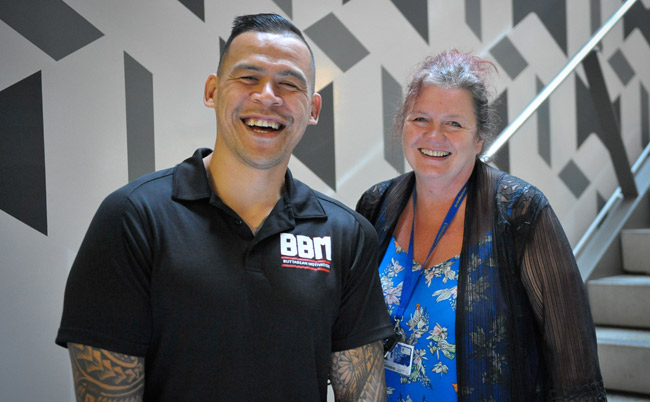
Obesity Prevention and Management paper convenor Lesley Gray (right) with one of the paper's guest speakers, former celebrity boxer Dave Letele.
A postgraduate distance education paper in Obesity Prevention and Management run by the University of Otago, Wellington has enlisted help from some hard hitters in a quest to improve the management of patients in the community.
Guest speakers on the innovative postgraduate paper GENA737 have ranged from the founder of the Brown Buttabean Motivation programme, former celebrity boxer Dave Letele, to academic staff, including Associate Professor Kirsten Coppell from the Dunedin School of Medicine, who is Deputy Director of the Edgar National Centre for Diabetes and Obesity Research, and Professor Tony Dowell from the Department of Primary Health Care and General Practice at the University of Otago, Wellington.
The 30-point academic paper is convened by Lesley Gray, a Senior Lecturer in the Department of Primary Health Care and General Practice who is passionate about improving the knowledge about, and appropriate management of, obesity in the community. The paper can be taken as part of a range of postgraduate qualifications including primary health care, nutrition, and the newly-established qualification endorsed in obesity prevention and management, led by Dr Hamish Osborne, Senior Lecturer in the Department of Medicine, Dunedin.
"Health professionals come in for a lot of criticism around how they approach weight management and what their own weight stigmas and biases are."
The paper attracts a diverse group of students from general practitioners and nurses to pharmacists, nutrition students and fitness coaches who come together at a three-day residential programme at the Wellington campus.
Students study the causes of obesity, the prevalence of obesity, the systems and drivers of obesity, weight stigma and bias and what can be done in practice in terms of prevention and management from an evidence base.
Beyond that, readings are tailored to the needs of specific students each year.
“This year, we have students with interests in childhood obesity, epigenetics and the role of particular fitness disciplines, such as cross fit for example. Some of the GPs want to know what they can do in practice to be more effective at what they do concerning obesity in their own work place.”
Students are challenged to examine their own biases about weight and are encouraged to complete Harvard University's Implicit Association Test to check their own biases on weight - although Ms Gray says they are not required to share the result.
“Health professionals come in for a lot of criticism around how they approach weight management and what their own weight stigmas and biases are. If we see a fat person in front of us, some practitioners will make assumptions about the health or health needs of that person, without actually assessing their actual health needs.”
Ms Gray says doctors tell her they receive very little education around the prevention and management of obesity during their training and yet much of their day-to-day work involves people living with obesity.
Former celebrity boxer turned healthy lifestyle advocate Dave Letele, better known as 'Brown Buttabean', shared his own personal story with the students at this year's residential programme in Wellington. Mr Letele founded Brown Buttabean Motivation (BBM) after being asked about his weight loss by boxing fans watching him on television. His programme now provides free community boot camp sessions to 1,000 people a week in Auckland.
"You have to really want to change – and have the resources and means to make small changes that contribute to a healthier lifestyle. Weight loss is not the main focus: achieving and sustaining your 'why' is the goal."
Mr Letele weighed in at 210 kilos before he decided it was time for a change.
“I was sick and tired of feeling sick and tired,” he says. “I couldn't tie my shoelaces. I was sweating all the time, just walking five metres. I was very unhappy in the body I felt trapped in.”
Mr Letele had already earned his nickname 'Brown Buttabean', a homage of sorts to the famous and now retired American boxer, Eric Esch.
“He was a big fat white guy, and so when I started boxing, that's the name they gave me. Because I was a big fat brown guy, they called me the 'Brown Buttabean'.”
He hopes that hearing his story will help students on the programme understand what those with weight issues might be going through.
“When I was 210 kilos, I didn't want to be that way. I didn't want to be so overweight and unhealthy, it's just so many things happened in my life that led me there.”
His motivation to lose weight came from a desire to be a better example to his children, what is known in his programme as finding 'your why'.
“You have to really want to change – and have the resources and means to make small changes that contribute to a healthier lifestyle. Weight loss is not the main focus: achieving and sustaining your 'why' is the goal.”